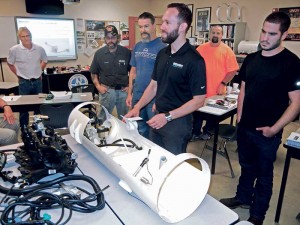Service techs: Who are they?

Propane Autogas Vehicle Technician Training gives automotive technicians the opportunity to get up close with components of autogas fuel systems. Here, Lance Suttle, training coordinator at Roush CleanTech, foreground, points out an installed propane autogas fuel tank in a cutaway of a Roush tank. Photo courtesy of NAFTC
Not every automotive technician and service shop is necessarily a fit as a propane autogas vehicle service provider.
A number of techs are, however, trained to service autogas fuel systems. Albert Venezio, chairman at Icom North America, breaks these techs into three groups.
“One is the old propane technician who lived through the 1980s and 1990s,” says Venezio, who adds that this group represents the majority of techs who service autogas vehicles. “They worked for a propane company or a company that built bobtails. They know the vehicles well. You’ve got to kind of work with them, especially with liquid injection, because it has exceeded the old vehicle technology. Once they get through that, they’re great to work with.”
A second group of techs is from today’s generation.
“These are the young guys who are 20 to 40 years old, or even a couple in their 50s who went back to an NAFTC school and took some classes,” Venezio says. “They were inspired to find out who manufactured these [fuel] systems, and they want to work with them or open up their own shop.”
Venezio categorizes a third group somewhat differently.
“These are just very good technicians – they might even be a shop owner who’s an ASE (Automotive Service Excellence) technician,” he says. “Usually, these guys have a thirst for knowledge. They want to learn about natural gas and propane.”
Ed Hoffman, president at Blossman Services, brings a somewhat different perspective to the discussion on categories of propane techs.
“There’s two different mentalities of technicians,” Hoffman says. “One’s a fleet technician; one’s a retail technician.”
To Hoffman, the propane industry has a better chance to invigorate fleet techs than retail techs about autogas.
“The fleet technician is more of a craftsman who ensures vehicle uptime and customer satisfaction,” Hoffman says. “That technician is not trying to maximize the hours of the day.”
The retail tech’s goals are different, he adds. Hoffman uses a young technician who’s just emerged from a trade school to explain why.
“This technician is going to have two or three different paths to follow for his career,” he says. “One is a quick lube or tire shop. They’ll grab a technician to do the dirty work; learn more skills; learn how to hustle and do two jobs at once to maximize [hours].
“The second is the dealership route,” Hoffman adds. “The person probably goes through ongoing service training to become better. But they want two hours for a brake job yet they do it in an hour and a half, whereas the fleet tech is going to take straight time. There may be a productivity bonus, but if it takes three hours you charge three hours. They’re going to take their time and do their job right.”
















